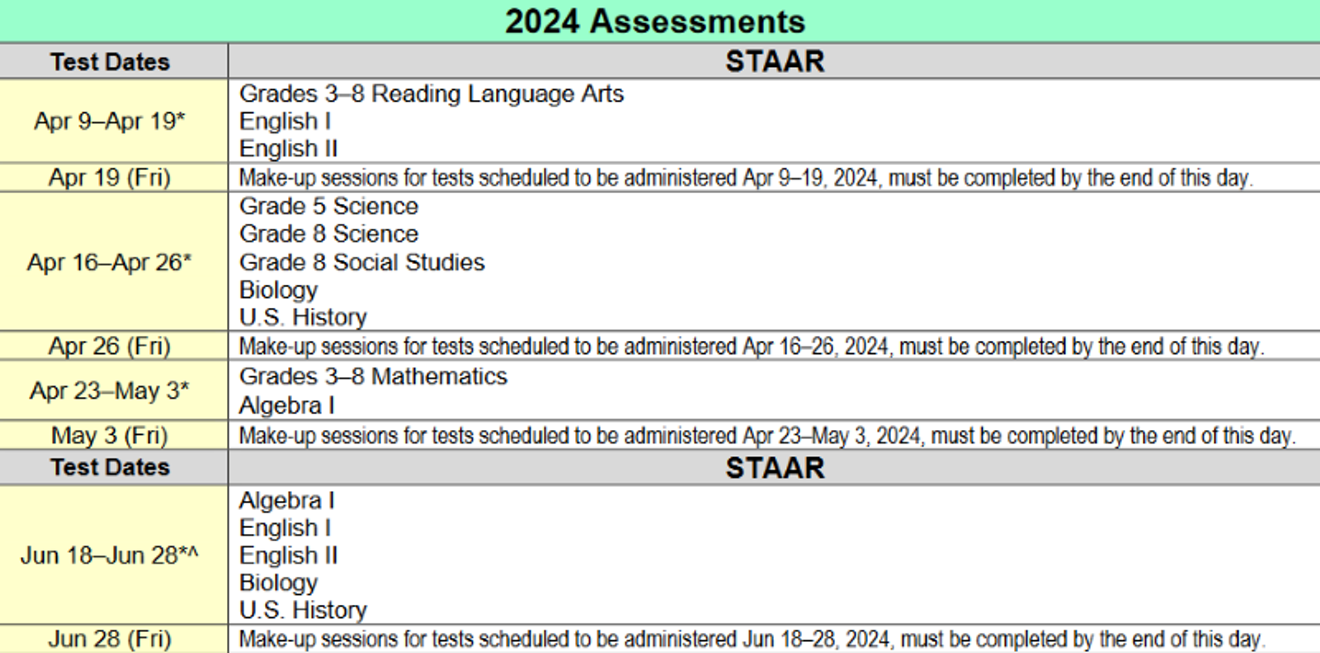Support Us
Houston's independent source of
local news and culture
account
- Welcome,
Insider - Login
- My Account
- My Newsletters
- Contribute
- Contact Us
- Sign out
Column: What's Going to Happen to the STAAR Scores With No Test Prep?
Margaret Downing April 4, 2024 4:30AM

April is the month for STAAR tests in Texas.
Screenshot
[
{
"name": "Related Stories / Support Us Combo",
"component": "11591218",
"insertPoint": "4",
"requiredCountToDisplay": "4"
},{
"name": "Air - Billboard - Inline Content",
"component": "11591214",
"insertPoint": "2/3",
"requiredCountToDisplay": "7"
},{
"name": "R1 - Beta - Mobile Only",
"component": "12287027",
"insertPoint": "8",
"requiredCountToDisplay": "8"
},{
"name": "Air - MediumRectangle - Inline Content - Mobile Display Size 2",
"component": "11591215",
"insertPoint": "12",
"requiredCountToDisplay": "12"
},{
"name": "Air - MediumRectangle - Inline Content - Mobile Display Size 2",
"component": "11591215",
"insertPoint": "4th",
"startingPoint": "16",
"requiredCountToDisplay": "12"
}
]
The scenario has been a familiar one for students, parents and teachers in Houston ISD. As they approached the annual STAAR testing in the spring, hours of practice tests would replace large portions of the day for children in certain grades.
Struggling students were identified and pulled out for "small group interventions." Some stayed for afterschool or weekend tutoring. The extra help would continue right up until the day before STAAR testing day. Pep rallies complete with visiting school bands became elaborate events to further inspire students to do their best on the tests.
This year, however, there will be no STAAR test prep in many of the HISD schools.
Although HISD insists there is no official policy against it, teachers in some schools say that's not what they are being told by their principals. Instead, they are instructed to continue as usual with their lesson plans and not deviate from that path. In the case of New Education System System and NES-Aligned schools, that means lesson plans issued by central office.
A statement released by HISD in response to our questions, makes clear that the thinking is that if students are getting the right instruction on a daily basis, there is no need for STAAR test prep.
"Our expectation is that every HISD student receives high-quality grade level instruction in every classroom every day. As a result, schools should not need to do anything differently to prepare for assessments. The guidance for all campuses leading up to STAAR and the end of year NWEA assessments is to continue with that quality, grade-level instruction on their campus.
"Individual campuses may choose to provide additional preparation time for their students such as Saturday clinics. These are at the discretion of building leaders. The central office has not issued formal guidance on this topic. Non-NES campus administrators were provided the scope and sequence of the NES curriculum as an optional resource. The document provides teachers and leaders with an understanding of what standards are being covered each day in the NES curriculum."
The change in approach came as a surprise to more than a few experienced teachers.
"I thought my campus dropped the ball this year but I'm hearing that HISD leadership has prohibited prepping students for STAAR," one teacher wrote us.
Another teacher, one who teaches third grade reading is worried. She's concerned the her students will not do well on STAAR without specific preparation for these online tests. She's afraid they won't remember lessons taught much earlier in the year. And that their computer skills — they've only begun taking tests online in the last two weeks — won't be up to par.
There is considerable irony in all this.
For years HISD parents and teachers justifiably complained that there was too much emphasis on the STAAR both in execution and test prep. Critics said students should be learning what they need to learn in classes designed to cover the Texas Essential Knowledge and Skills criteria. This extra time spent preparing for one test is nothing more than gaming the systems with "strategies" and taking kids away from what they should be learning, they charged.
Well now they got — in part — what many of them asked for with a Superintendent who echoes those views. And a lot of them don't like it. Their anxiety levels are rising and conspiracy theories have reached new levels: Is this being done so scores will tank and then the next year HISD Superintendent Mike Miles can show a dramatic improvement or call for more resources? Is this a way to get rid of more unwanted teachers? Is this a way to close down schools because no parent wants their child at a school with low test scores and with a drop in population those campuses will have to close, won't they?
"No one likes teaching to the test but it's those test scores that got our district in the situation it is and the scores are what will get us out. Is this intentional tanking?" one teacher asked.
Previously, passing the STAAR was a grade promotion requirement for students in grades 5 and 8 but the Texas Education Agency, saying it wanted to relieve pressure, dropped that part in 2023.
The pressure is still on for teachers, though. A big part of their annual assessment is based on how their students do on the State of Texas Assessments of Academic Readiness which began in the 2011-12 school year. Poor assessments can lead to not getting the school assignments they want or in worst cases, not having their contracts renewed.
The anxieties and rumors are probably part and parcel of not only a lack of trust of Miles and his academic and administrative policies in some quarters, but of an increasing wariness on the part of many teachers to share their true feelings with their administrators.
The teacher in an NESA school says that when teachers were called together at their school and the principal delivered the no-test-prep news saying that's what everybody was (not) doing, no one dared to ask why. "No one asked questions this whole year. Nobody gives pushback. Nobody tries to question it because the moment we do we are either reprimanded or we are considered as being defiant.
"We never got an explanation as to why we can’t help these kids or we can't focus on certain TEKS that were required. As a teacher, I go back and I check my data. I check on what the STAAR tested on in previous years. I apply that to my kids and I let them know this is going to be important; you’re going to need this for years to come," the teacher said..
"Usually right around March we start looking at how we can help the students [review]. And we spiraled them back into our lessons. This year because all the lessons are given to us, it's like they're not missing a beat. They keep giving us lesson after lesson and there is no time for us to focus on what the kids actually need.
"But this year we haven't been able to do any of that since we can't deviate from the lesson. We have no control over whether if the student got it today, he may not remember the following week or a month from now."
"This year it's like if you got it you got it, but those that didn't get it, they're just staying further behind. Asked about Saturday classes or tutorials, the teacher said those aren't occurring on her campus. They aren't doing small group interventions either. The standard reading class is 45 minutes of teaching followed by 10 minutes of testing and then another 30 to 35 minutes of going over the material for those who didn't pass the spot test. Then it's on to the next day's lesson.
Complicating matters for the third graders is this will be their first STAAR test and the first time they'll see it online. The students did begin doing their lessons on computer twice a week in March, the teacher said.
"My type of prepping would have been getting the students used to using the tools they have available. Practicing how to find the dictionary if they needed it. How to highlight, how to annotate on the side. We can't do that."
She has brought in some of this instruction, however, saying "I don't want to leave my kids in the dark, fending for themselves." This would probably get her a reprimand from her supervisors if they find out.
Reading remains the biggest challenge in test taking in HISD, the 3rd grade teacher said. "[In the first year I was teaching,] some of them came to me not knowing how to write their own names. The following year it was the first time they were going to test on the computer. They didn't know how to type. This year they’ve had the practice more often now, but now it's more developing those ideas and putting those ideas on paper."
All this naturally leads into a larger discussion of standardized tests in general. If they are just assessments of what students learn in class, why do so many high school students whose families have the money go to The Princeton Review, Kaplan or Varsity Tutors? Probably because that kind of intense review and test-taking strategies taught there give them an edge in taking their SATs. Many are smart kids doing well in their classes, but they can't afford a stumble on these high consequence, statewide and national tests.
So when did a review before a test get a bad name? Well, when it is done badly and at the expense of other facts a student could be learning. Even teachers will admit that some of their HISD peers went overboard. Too much and its a mind-numbing waste of time and a pressure all its own. Not enough or absent at all and kids may be searching their brains desperately for facts they used to know and now have only fuzzy memories of.
Not helping matters, the number of cheating scandals involving teachers that surfaced on HISD STAAR tests in 2011, 2013, 2014 and 2015, usually detected by two many erasures on tests and/or a miraculous turnaround for the better in student scores. Linking teacher pay and evaluations to STAAR results, as it turns out, has always had some undesirable side effects.
This past August, Miles announced the results of the STAAR tests from the prior school term, when he wasn't yet at HISD. They were not good. Post pandemic, student scores had dropped significantly and they weren't that great before that. He used this as more evidence that a drastic overhaul of HISD's academics was needed.
This coming year, he'll have to own the STAAR scores, at least in the schools he's focused on with NES principles. There will, of course, be qualifiers to the outcomes. This is just the first year. This is a slow process and can't be turned around overnight. He and the Board of Managers while promising results, have already been very careful not to set their goals too high, at least not initially.
Lowballing expectations or not, everyone will be watching, to see what those scores are and how they will affect teachers and their schools. And if they remain low, what's next? In the face of a Houston business community screaming in exasperation at continuing low scores, will the man and board brought in by the state to fix the district change course at all?
In a perfect world, we'd all remember everything we learned in school, all those facts and figures, quickly and efficiently absorbed and retained. In reality, most of us can't recall the details of the National Geographic show on rhinos we watched last night.
Most of us wouldn't be able to go into an important test and do well without some review ahead of time. Here's hoping the kids in the new HISD are better than most of us.
KEEP THE HOUSTON PRESS FREE...
Since we started the Houston Press, it has been defined as the free, independent voice of Houston, and we'd like to keep it that way. With local media under siege, it's more important than ever for us to rally support behind funding our local journalism. You can help by participating in our "I Support" program, allowing us to keep offering readers access to our incisive coverage of local news, food and culture with no paywalls.
Margaret Downing is the editor-in-chief who oversees the Houston Press newsroom and its online publication. She frequently writes on a wide range of subjects.
Contact:
Margaret Downing
Follow:
Facebook:
HoustonPress
Twitter:
@HoustonPress
Trending News
- Four Reasons the Astros Are Bad at Baseball Right Now
- Measles On The Rise, Health Experts Say, and Houston Isn't Immune
- Texans GM Nick Caserio Will Generate NFL Draft Fireworks on Friday Night
-
Sponsored Content From: [%sponsoredBy%]
[%title%]

Don't Miss Out
SIGN UP for the latest
news, free stuff and more!
Become a member to support the independent voice of Houston
and help keep the future of the Houston Press FREE
Use of this website constitutes acceptance of our
terms of use,
our cookies policy, and our
privacy policy
The Houston Press may earn a portion of sales from products & services purchased through links on our site from our
affiliate partners.
©2024
Houston Press, LP. All rights reserved.





